Factors Affecting Entrepreneurial Mindset
VerifiedAdded on 2020/10/22
|15
|4771
|426
AI Summary
The provided document is about entrepreneurship and the factors that influence entrepreneurial mindsets. It draws from various sources, including books, journals, and online articles. The content covers topics such as small businesses, entrepreneurship theories, and social entrepreneurship. The assignment aims to understand what affects an entrepreneur's mindset and how they can build a positive mindset for innovative endeavors.
Contribute Materials
Your contribution can guide someone’s learning journey. Share your
documents today.

Entrepreneurship And Small
Business Management
Business Management
Secure Best Marks with AI Grader
Need help grading? Try our AI Grader for instant feedback on your assignments.
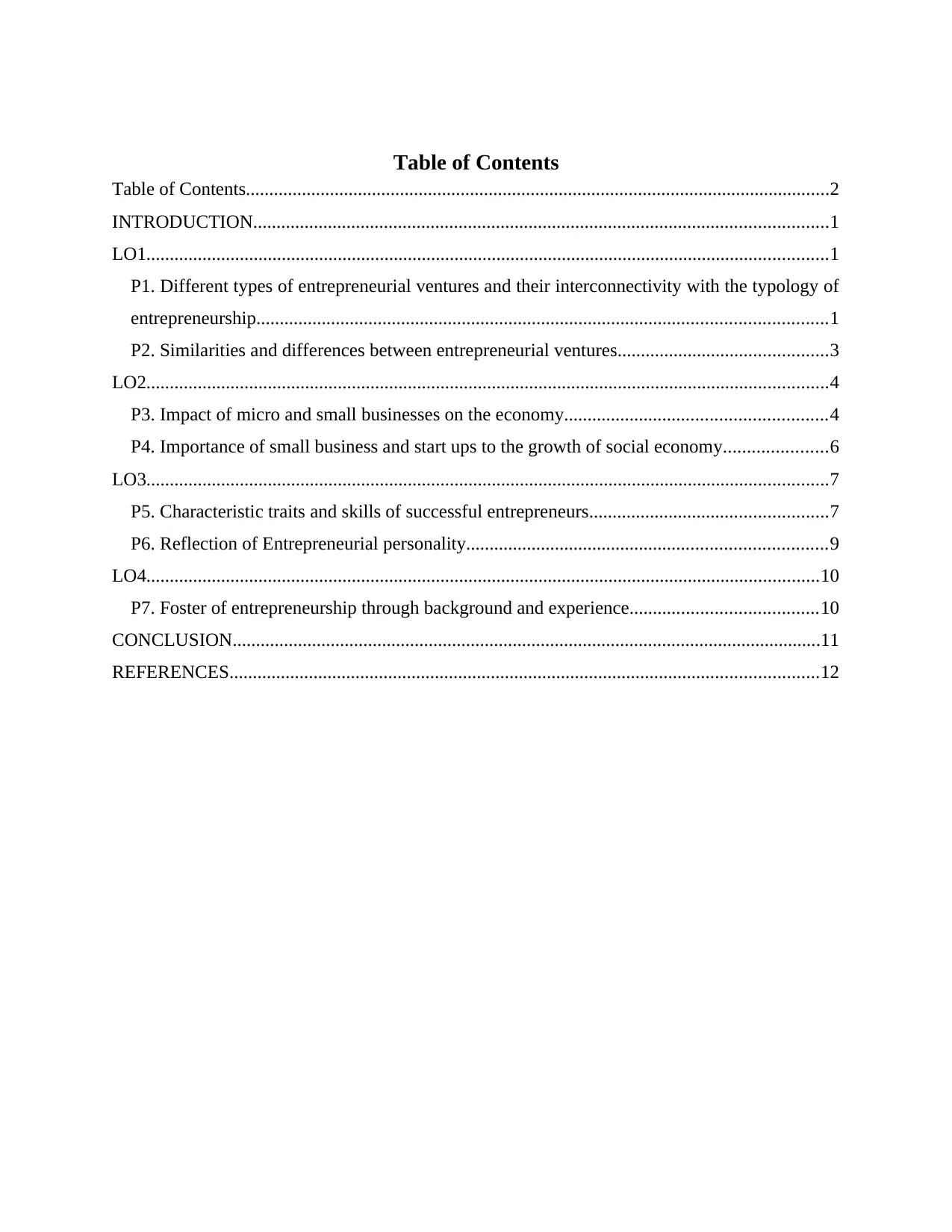
Table of Contents
Table of Contents.............................................................................................................................2
INTRODUCTION...........................................................................................................................1
LO1..................................................................................................................................................1
P1. Different types of entrepreneurial ventures and their interconnectivity with the typology of
entrepreneurship..........................................................................................................................1
P2. Similarities and differences between entrepreneurial ventures.............................................3
LO2..................................................................................................................................................4
P3. Impact of micro and small businesses on the economy........................................................4
P4. Importance of small business and start ups to the growth of social economy......................6
LO3..................................................................................................................................................7
P5. Characteristic traits and skills of successful entrepreneurs...................................................7
P6. Reflection of Entrepreneurial personality.............................................................................9
LO4................................................................................................................................................10
P7. Foster of entrepreneurship through background and experience........................................10
CONCLUSION..............................................................................................................................11
REFERENCES..............................................................................................................................12
Table of Contents.............................................................................................................................2
INTRODUCTION...........................................................................................................................1
LO1..................................................................................................................................................1
P1. Different types of entrepreneurial ventures and their interconnectivity with the typology of
entrepreneurship..........................................................................................................................1
P2. Similarities and differences between entrepreneurial ventures.............................................3
LO2..................................................................................................................................................4
P3. Impact of micro and small businesses on the economy........................................................4
P4. Importance of small business and start ups to the growth of social economy......................6
LO3..................................................................................................................................................7
P5. Characteristic traits and skills of successful entrepreneurs...................................................7
P6. Reflection of Entrepreneurial personality.............................................................................9
LO4................................................................................................................................................10
P7. Foster of entrepreneurship through background and experience........................................10
CONCLUSION..............................................................................................................................11
REFERENCES..............................................................................................................................12
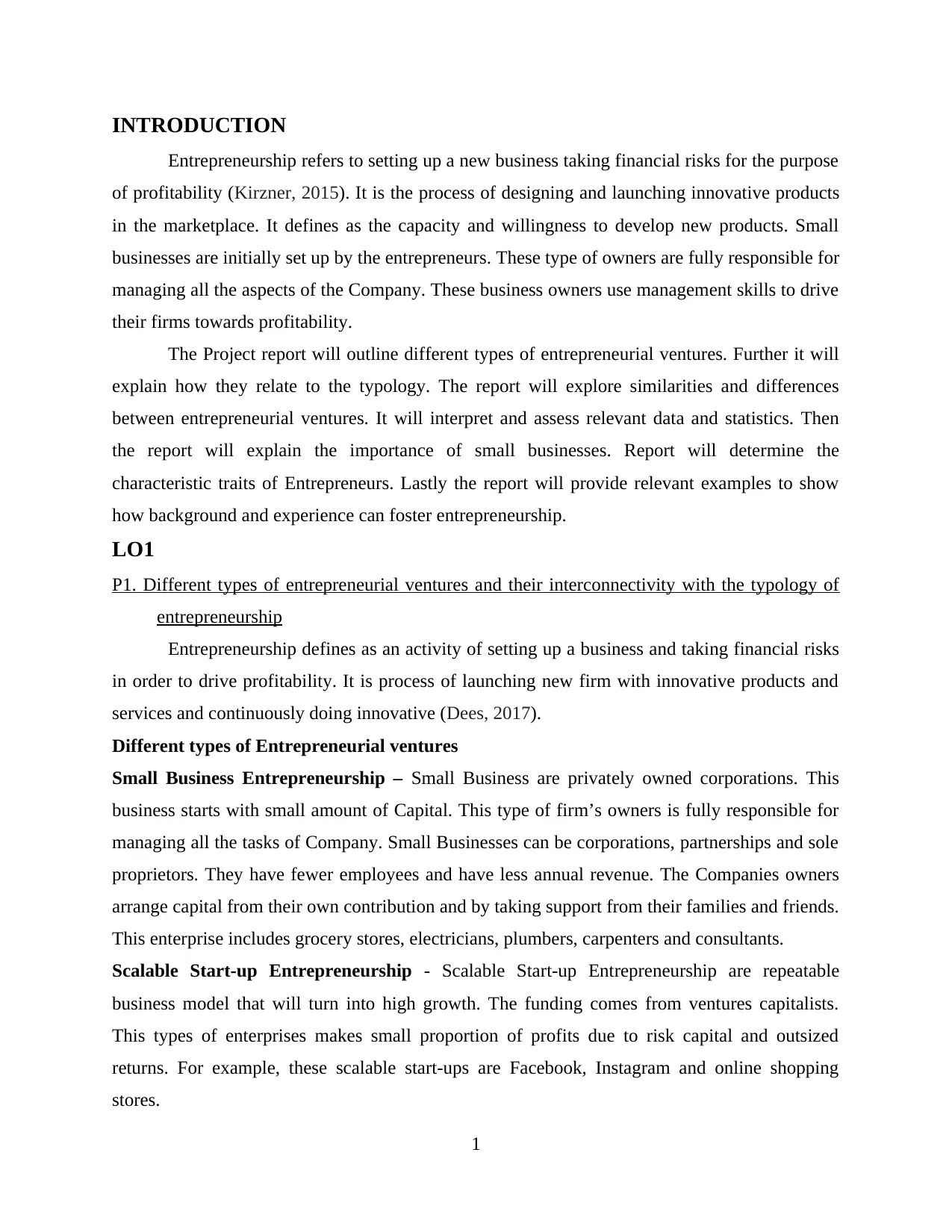
INTRODUCTION
Entrepreneurship refers to setting up a new business taking financial risks for the purpose
of profitability (Kirzner, 2015). It is the process of designing and launching innovative products
in the marketplace. It defines as the capacity and willingness to develop new products. Small
businesses are initially set up by the entrepreneurs. These type of owners are fully responsible for
managing all the aspects of the Company. These business owners use management skills to drive
their firms towards profitability.
The Project report will outline different types of entrepreneurial ventures. Further it will
explain how they relate to the typology. The report will explore similarities and differences
between entrepreneurial ventures. It will interpret and assess relevant data and statistics. Then
the report will explain the importance of small businesses. Report will determine the
characteristic traits of Entrepreneurs. Lastly the report will provide relevant examples to show
how background and experience can foster entrepreneurship.
LO1
P1. Different types of entrepreneurial ventures and their interconnectivity with the typology of
entrepreneurship
Entrepreneurship defines as an activity of setting up a business and taking financial risks
in order to drive profitability. It is process of launching new firm with innovative products and
services and continuously doing innovative (Dees, 2017).
Different types of Entrepreneurial ventures
Small Business Entrepreneurship – Small Business are privately owned corporations. This
business starts with small amount of Capital. This type of firm’s owners is fully responsible for
managing all the tasks of Company. Small Businesses can be corporations, partnerships and sole
proprietors. They have fewer employees and have less annual revenue. The Companies owners
arrange capital from their own contribution and by taking support from their families and friends.
This enterprise includes grocery stores, electricians, plumbers, carpenters and consultants.
Scalable Start-up Entrepreneurship - Scalable Start-up Entrepreneurship are repeatable
business model that will turn into high growth. The funding comes from ventures capitalists.
This types of enterprises makes small proportion of profits due to risk capital and outsized
returns. For example, these scalable start-ups are Facebook, Instagram and online shopping
stores.
1
Entrepreneurship refers to setting up a new business taking financial risks for the purpose
of profitability (Kirzner, 2015). It is the process of designing and launching innovative products
in the marketplace. It defines as the capacity and willingness to develop new products. Small
businesses are initially set up by the entrepreneurs. These type of owners are fully responsible for
managing all the aspects of the Company. These business owners use management skills to drive
their firms towards profitability.
The Project report will outline different types of entrepreneurial ventures. Further it will
explain how they relate to the typology. The report will explore similarities and differences
between entrepreneurial ventures. It will interpret and assess relevant data and statistics. Then
the report will explain the importance of small businesses. Report will determine the
characteristic traits of Entrepreneurs. Lastly the report will provide relevant examples to show
how background and experience can foster entrepreneurship.
LO1
P1. Different types of entrepreneurial ventures and their interconnectivity with the typology of
entrepreneurship
Entrepreneurship defines as an activity of setting up a business and taking financial risks
in order to drive profitability. It is process of launching new firm with innovative products and
services and continuously doing innovative (Dees, 2017).
Different types of Entrepreneurial ventures
Small Business Entrepreneurship – Small Business are privately owned corporations. This
business starts with small amount of Capital. This type of firm’s owners is fully responsible for
managing all the tasks of Company. Small Businesses can be corporations, partnerships and sole
proprietors. They have fewer employees and have less annual revenue. The Companies owners
arrange capital from their own contribution and by taking support from their families and friends.
This enterprise includes grocery stores, electricians, plumbers, carpenters and consultants.
Scalable Start-up Entrepreneurship - Scalable Start-up Entrepreneurship are repeatable
business model that will turn into high growth. The funding comes from ventures capitalists.
This types of enterprises makes small proportion of profits due to risk capital and outsized
returns. For example, these scalable start-ups are Facebook, Instagram and online shopping
stores.
1
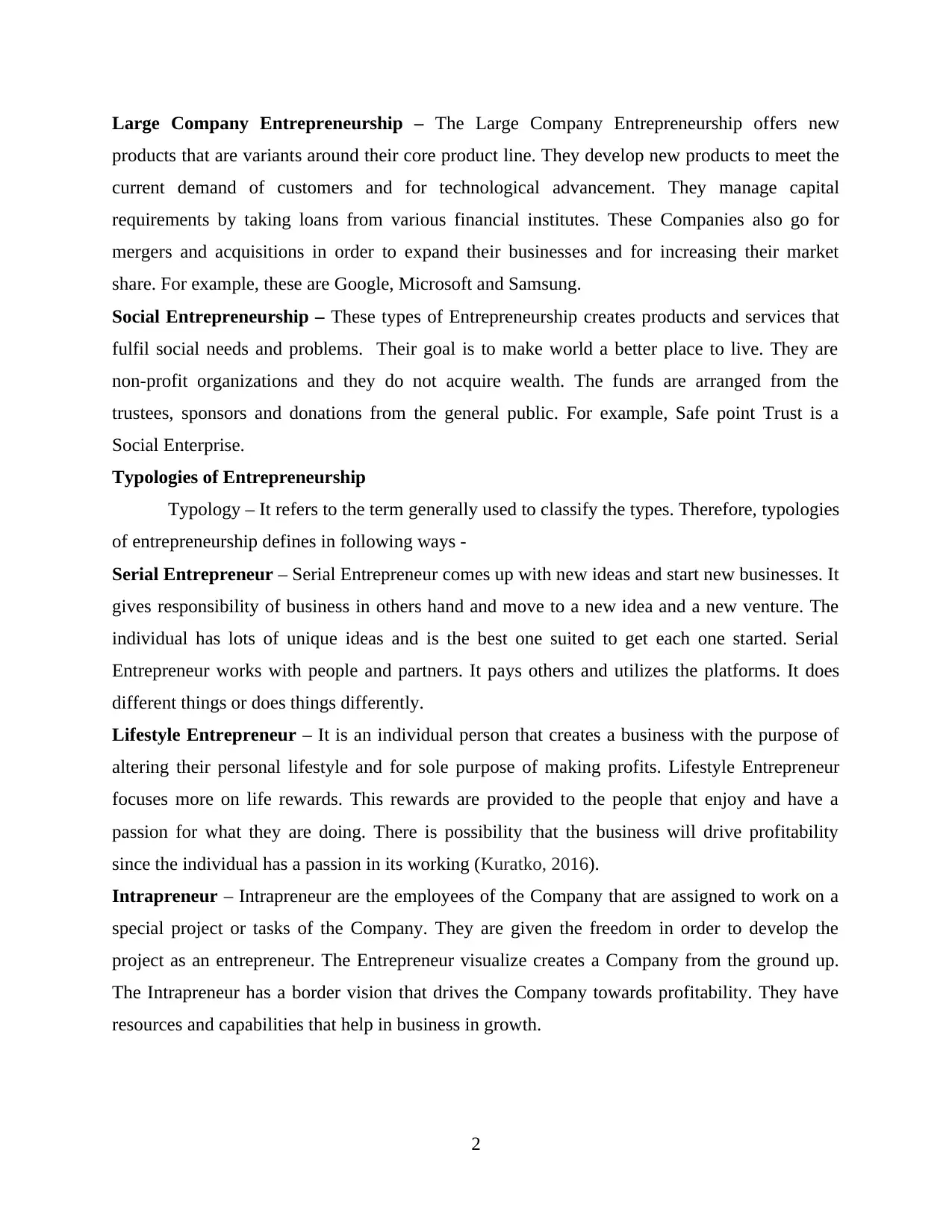
Large Company Entrepreneurship – The Large Company Entrepreneurship offers new
products that are variants around their core product line. They develop new products to meet the
current demand of customers and for technological advancement. They manage capital
requirements by taking loans from various financial institutes. These Companies also go for
mergers and acquisitions in order to expand their businesses and for increasing their market
share. For example, these are Google, Microsoft and Samsung.
Social Entrepreneurship – These types of Entrepreneurship creates products and services that
fulfil social needs and problems. Their goal is to make world a better place to live. They are
non-profit organizations and they do not acquire wealth. The funds are arranged from the
trustees, sponsors and donations from the general public. For example, Safe point Trust is a
Social Enterprise.
Typologies of Entrepreneurship
Typology – It refers to the term generally used to classify the types. Therefore, typologies
of entrepreneurship defines in following ways -
Serial Entrepreneur – Serial Entrepreneur comes up with new ideas and start new businesses. It
gives responsibility of business in others hand and move to a new idea and a new venture. The
individual has lots of unique ideas and is the best one suited to get each one started. Serial
Entrepreneur works with people and partners. It pays others and utilizes the platforms. It does
different things or does things differently.
Lifestyle Entrepreneur – It is an individual person that creates a business with the purpose of
altering their personal lifestyle and for sole purpose of making profits. Lifestyle Entrepreneur
focuses more on life rewards. This rewards are provided to the people that enjoy and have a
passion for what they are doing. There is possibility that the business will drive profitability
since the individual has a passion in its working (Kuratko, 2016).
Intrapreneur – Intrapreneur are the employees of the Company that are assigned to work on a
special project or tasks of the Company. They are given the freedom in order to develop the
project as an entrepreneur. The Entrepreneur visualize creates a Company from the ground up.
The Intrapreneur has a border vision that drives the Company towards profitability. They have
resources and capabilities that help in business in growth.
2
products that are variants around their core product line. They develop new products to meet the
current demand of customers and for technological advancement. They manage capital
requirements by taking loans from various financial institutes. These Companies also go for
mergers and acquisitions in order to expand their businesses and for increasing their market
share. For example, these are Google, Microsoft and Samsung.
Social Entrepreneurship – These types of Entrepreneurship creates products and services that
fulfil social needs and problems. Their goal is to make world a better place to live. They are
non-profit organizations and they do not acquire wealth. The funds are arranged from the
trustees, sponsors and donations from the general public. For example, Safe point Trust is a
Social Enterprise.
Typologies of Entrepreneurship
Typology – It refers to the term generally used to classify the types. Therefore, typologies
of entrepreneurship defines in following ways -
Serial Entrepreneur – Serial Entrepreneur comes up with new ideas and start new businesses. It
gives responsibility of business in others hand and move to a new idea and a new venture. The
individual has lots of unique ideas and is the best one suited to get each one started. Serial
Entrepreneur works with people and partners. It pays others and utilizes the platforms. It does
different things or does things differently.
Lifestyle Entrepreneur – It is an individual person that creates a business with the purpose of
altering their personal lifestyle and for sole purpose of making profits. Lifestyle Entrepreneur
focuses more on life rewards. This rewards are provided to the people that enjoy and have a
passion for what they are doing. There is possibility that the business will drive profitability
since the individual has a passion in its working (Kuratko, 2016).
Intrapreneur – Intrapreneur are the employees of the Company that are assigned to work on a
special project or tasks of the Company. They are given the freedom in order to develop the
project as an entrepreneur. The Entrepreneur visualize creates a Company from the ground up.
The Intrapreneur has a border vision that drives the Company towards profitability. They have
resources and capabilities that help in business in growth.
2
Secure Best Marks with AI Grader
Need help grading? Try our AI Grader for instant feedback on your assignments.
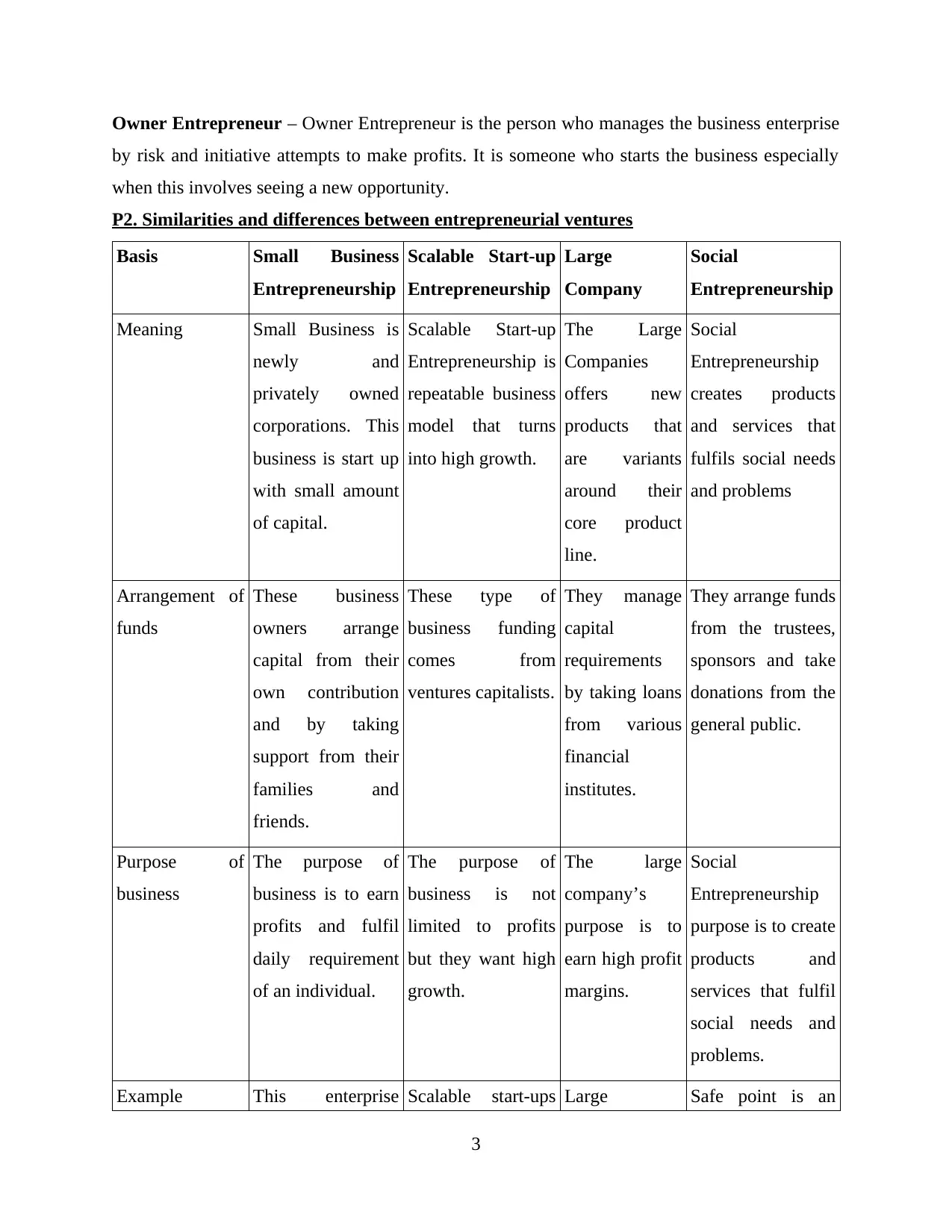
Owner Entrepreneur – Owner Entrepreneur is the person who manages the business enterprise
by risk and initiative attempts to make profits. It is someone who starts the business especially
when this involves seeing a new opportunity.
P2. Similarities and differences between entrepreneurial ventures
Basis Small Business
Entrepreneurship
Scalable Start-up
Entrepreneurship
Large
Company
Social
Entrepreneurship
Meaning Small Business is
newly and
privately owned
corporations. This
business is start up
with small amount
of capital.
Scalable Start-up
Entrepreneurship is
repeatable business
model that turns
into high growth.
The Large
Companies
offers new
products that
are variants
around their
core product
line.
Social
Entrepreneurship
creates products
and services that
fulfils social needs
and problems
Arrangement of
funds
These business
owners arrange
capital from their
own contribution
and by taking
support from their
families and
friends.
These type of
business funding
comes from
ventures capitalists.
They manage
capital
requirements
by taking loans
from various
financial
institutes.
They arrange funds
from the trustees,
sponsors and take
donations from the
general public.
Purpose of
business
The purpose of
business is to earn
profits and fulfil
daily requirement
of an individual.
The purpose of
business is not
limited to profits
but they want high
growth.
The large
company’s
purpose is to
earn high profit
margins.
Social
Entrepreneurship
purpose is to create
products and
services that fulfil
social needs and
problems.
Example This enterprise Scalable start-ups Large Safe point is an
3
by risk and initiative attempts to make profits. It is someone who starts the business especially
when this involves seeing a new opportunity.
P2. Similarities and differences between entrepreneurial ventures
Basis Small Business
Entrepreneurship
Scalable Start-up
Entrepreneurship
Large
Company
Social
Entrepreneurship
Meaning Small Business is
newly and
privately owned
corporations. This
business is start up
with small amount
of capital.
Scalable Start-up
Entrepreneurship is
repeatable business
model that turns
into high growth.
The Large
Companies
offers new
products that
are variants
around their
core product
line.
Social
Entrepreneurship
creates products
and services that
fulfils social needs
and problems
Arrangement of
funds
These business
owners arrange
capital from their
own contribution
and by taking
support from their
families and
friends.
These type of
business funding
comes from
ventures capitalists.
They manage
capital
requirements
by taking loans
from various
financial
institutes.
They arrange funds
from the trustees,
sponsors and take
donations from the
general public.
Purpose of
business
The purpose of
business is to earn
profits and fulfil
daily requirement
of an individual.
The purpose of
business is not
limited to profits
but they want high
growth.
The large
company’s
purpose is to
earn high profit
margins.
Social
Entrepreneurship
purpose is to create
products and
services that fulfil
social needs and
problems.
Example This enterprise Scalable start-ups Large Safe point is an
3
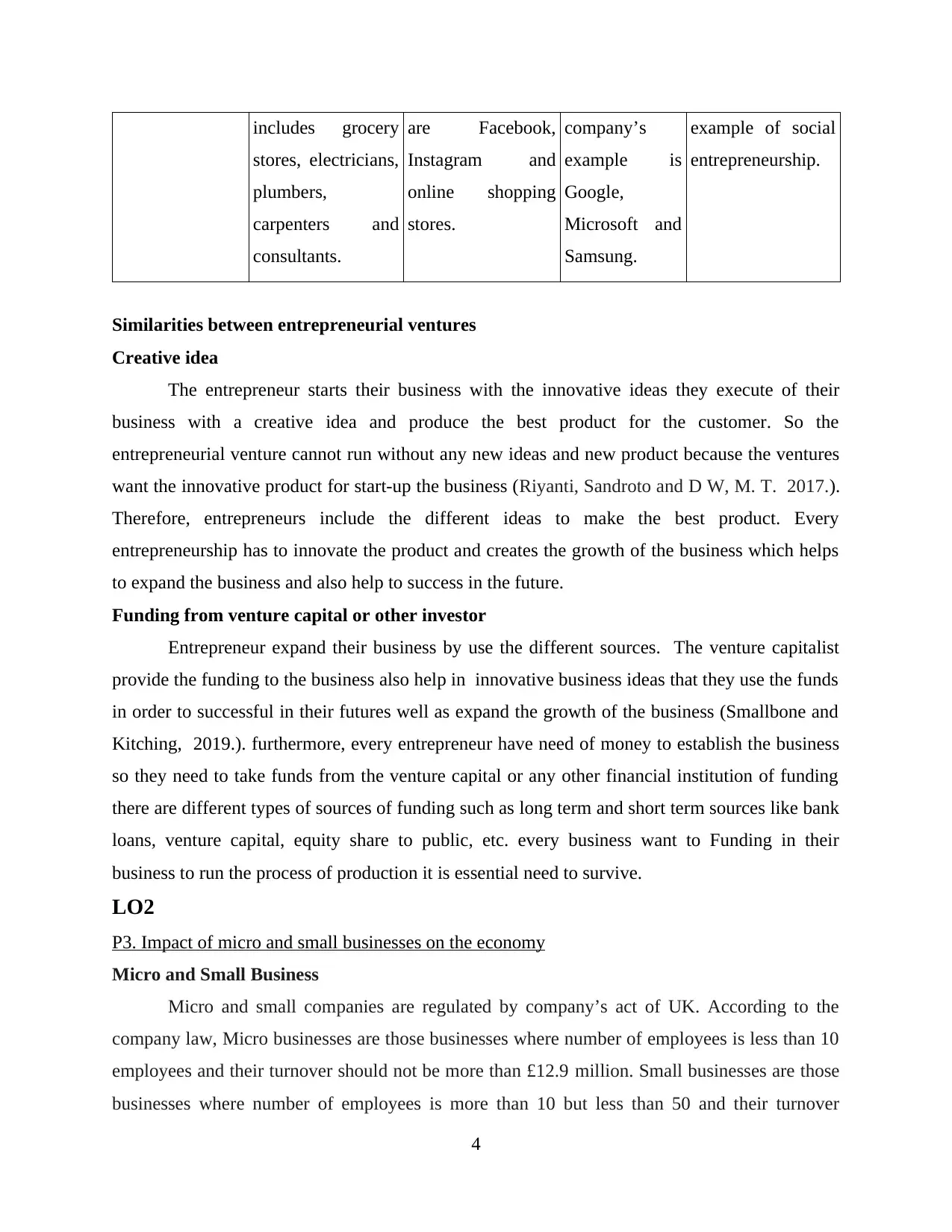
includes grocery
stores, electricians,
plumbers,
carpenters and
consultants.
are Facebook,
Instagram and
online shopping
stores.
company’s
example is
Google,
Microsoft and
Samsung.
example of social
entrepreneurship.
Similarities between entrepreneurial ventures
Creative idea
The entrepreneur starts their business with the innovative ideas they execute of their
business with a creative idea and produce the best product for the customer. So the
entrepreneurial venture cannot run without any new ideas and new product because the ventures
want the innovative product for start-up the business (Riyanti, Sandroto and D W, M. T. 2017.).
Therefore, entrepreneurs include the different ideas to make the best product. Every
entrepreneurship has to innovate the product and creates the growth of the business which helps
to expand the business and also help to success in the future.
Funding from venture capital or other investor
Entrepreneur expand their business by use the different sources. The venture capitalist
provide the funding to the business also help in innovative business ideas that they use the funds
in order to successful in their futures well as expand the growth of the business (Smallbone and
Kitching, 2019.). furthermore, every entrepreneur have need of money to establish the business
so they need to take funds from the venture capital or any other financial institution of funding
there are different types of sources of funding such as long term and short term sources like bank
loans, venture capital, equity share to public, etc. every business want to Funding in their
business to run the process of production it is essential need to survive.
LO2
P3. Impact of micro and small businesses on the economy
Micro and Small Business
Micro and small companies are regulated by company’s act of UK. According to the
company law, Micro businesses are those businesses where number of employees is less than 10
employees and their turnover should not be more than £12.9 million. Small businesses are those
businesses where number of employees is more than 10 but less than 50 and their turnover
4
stores, electricians,
plumbers,
carpenters and
consultants.
are Facebook,
Instagram and
online shopping
stores.
company’s
example is
Google,
Microsoft and
Samsung.
example of social
entrepreneurship.
Similarities between entrepreneurial ventures
Creative idea
The entrepreneur starts their business with the innovative ideas they execute of their
business with a creative idea and produce the best product for the customer. So the
entrepreneurial venture cannot run without any new ideas and new product because the ventures
want the innovative product for start-up the business (Riyanti, Sandroto and D W, M. T. 2017.).
Therefore, entrepreneurs include the different ideas to make the best product. Every
entrepreneurship has to innovate the product and creates the growth of the business which helps
to expand the business and also help to success in the future.
Funding from venture capital or other investor
Entrepreneur expand their business by use the different sources. The venture capitalist
provide the funding to the business also help in innovative business ideas that they use the funds
in order to successful in their futures well as expand the growth of the business (Smallbone and
Kitching, 2019.). furthermore, every entrepreneur have need of money to establish the business
so they need to take funds from the venture capital or any other financial institution of funding
there are different types of sources of funding such as long term and short term sources like bank
loans, venture capital, equity share to public, etc. every business want to Funding in their
business to run the process of production it is essential need to survive.
LO2
P3. Impact of micro and small businesses on the economy
Micro and Small Business
Micro and small companies are regulated by company’s act of UK. According to the
company law, Micro businesses are those businesses where number of employees is less than 10
employees and their turnover should not be more than £12.9 million. Small businesses are those
businesses where number of employees is more than 10 but less than 50 and their turnover
4
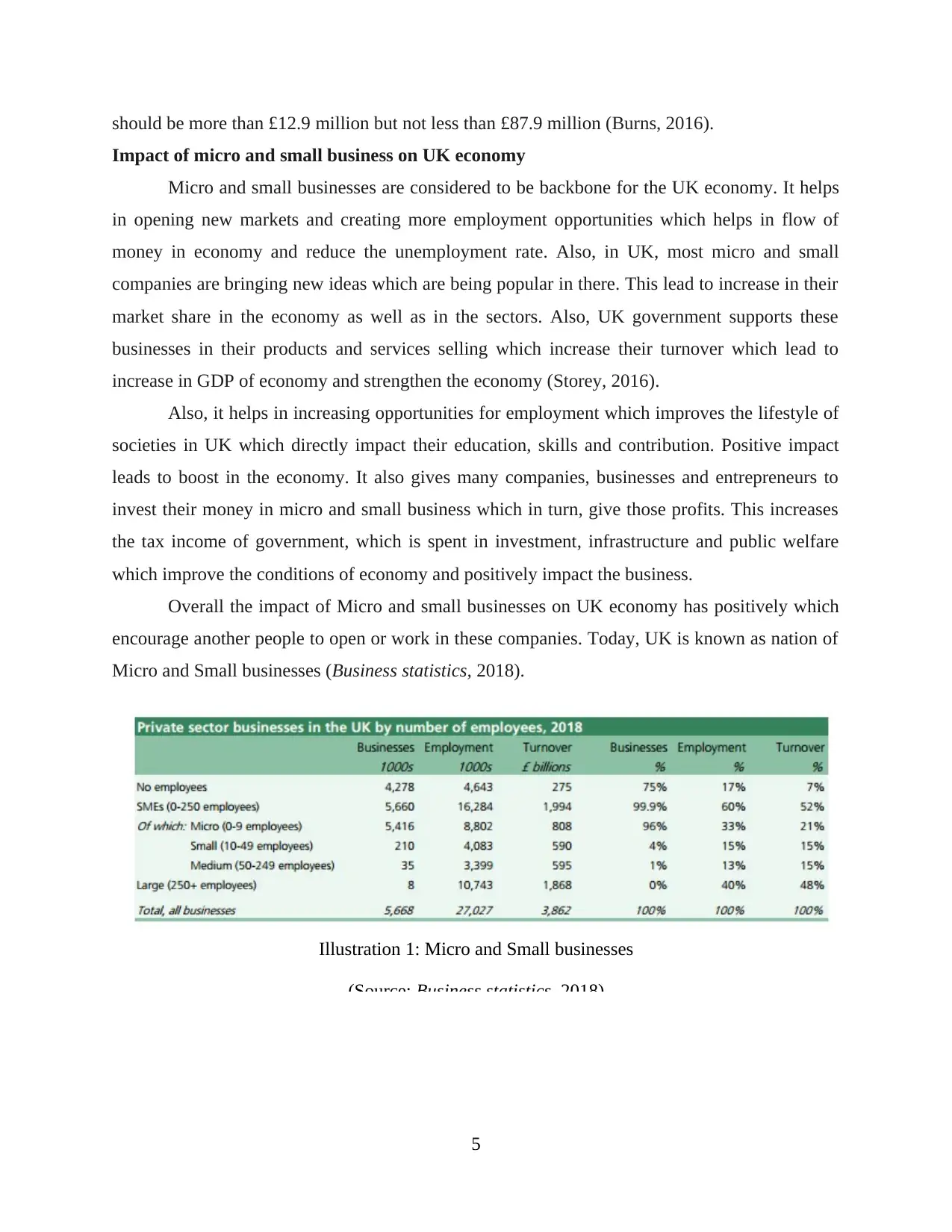
should be more than £12.9 million but not less than £87.9 million (Burns, 2016).
Impact of micro and small business on UK economy
Micro and small businesses are considered to be backbone for the UK economy. It helps
in opening new markets and creating more employment opportunities which helps in flow of
money in economy and reduce the unemployment rate. Also, in UK, most micro and small
companies are bringing new ideas which are being popular in there. This lead to increase in their
market share in the economy as well as in the sectors. Also, UK government supports these
businesses in their products and services selling which increase their turnover which lead to
increase in GDP of economy and strengthen the economy (Storey, 2016).
Also, it helps in increasing opportunities for employment which improves the lifestyle of
societies in UK which directly impact their education, skills and contribution. Positive impact
leads to boost in the economy. It also gives many companies, businesses and entrepreneurs to
invest their money in micro and small business which in turn, give those profits. This increases
the tax income of government, which is spent in investment, infrastructure and public welfare
which improve the conditions of economy and positively impact the business.
Overall the impact of Micro and small businesses on UK economy has positively which
encourage another people to open or work in these companies. Today, UK is known as nation of
Micro and Small businesses (Business statistics, 2018).
5
Illustration 1: Micro and Small businesses
(Source: Business statistics, 2018)
Impact of micro and small business on UK economy
Micro and small businesses are considered to be backbone for the UK economy. It helps
in opening new markets and creating more employment opportunities which helps in flow of
money in economy and reduce the unemployment rate. Also, in UK, most micro and small
companies are bringing new ideas which are being popular in there. This lead to increase in their
market share in the economy as well as in the sectors. Also, UK government supports these
businesses in their products and services selling which increase their turnover which lead to
increase in GDP of economy and strengthen the economy (Storey, 2016).
Also, it helps in increasing opportunities for employment which improves the lifestyle of
societies in UK which directly impact their education, skills and contribution. Positive impact
leads to boost in the economy. It also gives many companies, businesses and entrepreneurs to
invest their money in micro and small business which in turn, give those profits. This increases
the tax income of government, which is spent in investment, infrastructure and public welfare
which improve the conditions of economy and positively impact the business.
Overall the impact of Micro and small businesses on UK economy has positively which
encourage another people to open or work in these companies. Today, UK is known as nation of
Micro and Small businesses (Business statistics, 2018).
5
Illustration 1: Micro and Small businesses
(Source: Business statistics, 2018)
Paraphrase This Document
Need a fresh take? Get an instant paraphrase of this document with our AI Paraphraser
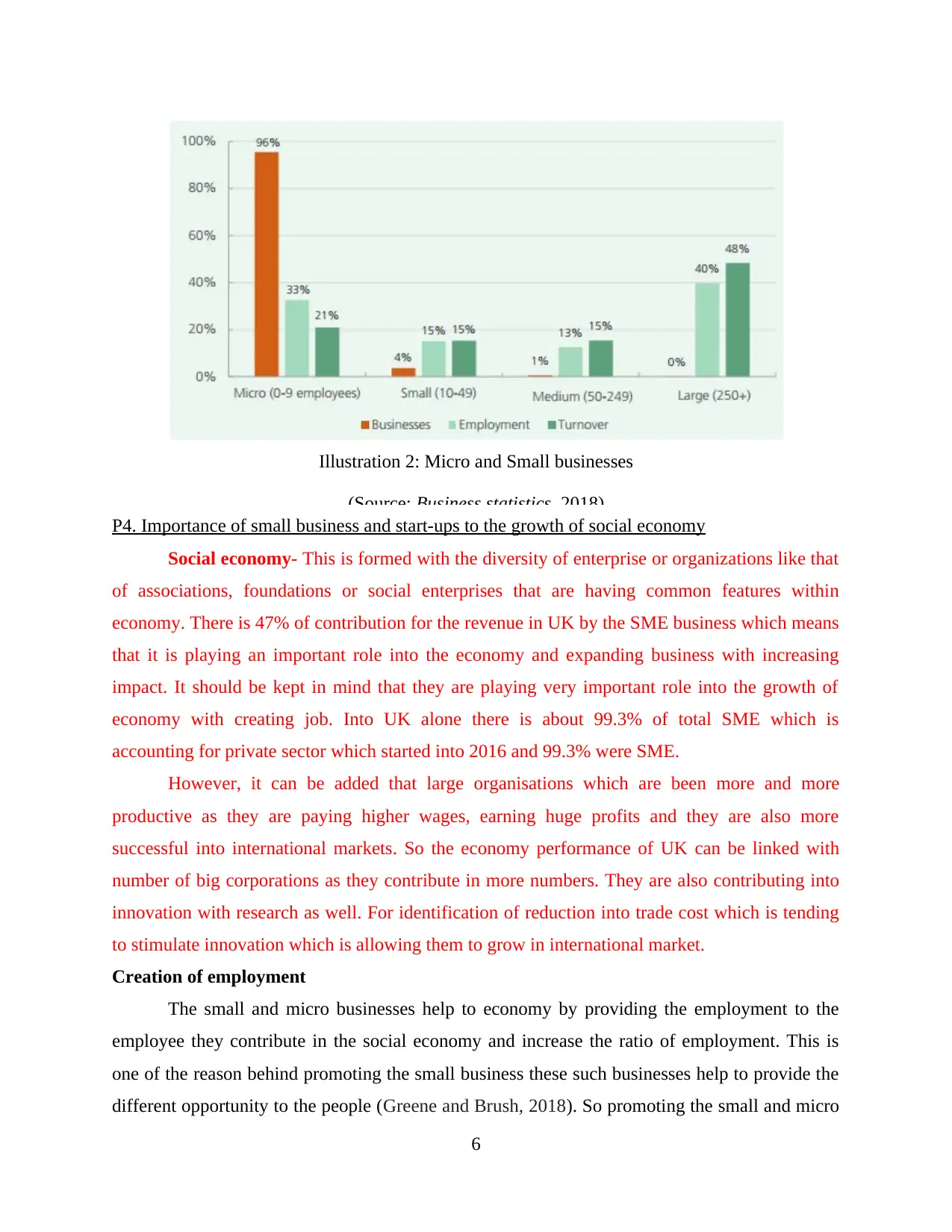
P4. Importance of small business and start-ups to the growth of social economy
Social economy- This is formed with the diversity of enterprise or organizations like that
of associations, foundations or social enterprises that are having common features within
economy. There is 47% of contribution for the revenue in UK by the SME business which means
that it is playing an important role into the economy and expanding business with increasing
impact. It should be kept in mind that they are playing very important role into the growth of
economy with creating job. Into UK alone there is about 99.3% of total SME which is
accounting for private sector which started into 2016 and 99.3% were SME.
However, it can be added that large organisations which are been more and more
productive as they are paying higher wages, earning huge profits and they are also more
successful into international markets. So the economy performance of UK can be linked with
number of big corporations as they contribute in more numbers. They are also contributing into
innovation with research as well. For identification of reduction into trade cost which is tending
to stimulate innovation which is allowing them to grow in international market.
Creation of employment
The small and micro businesses help to economy by providing the employment to the
employee they contribute in the social economy and increase the ratio of employment. This is
one of the reason behind promoting the small business these such businesses help to provide the
different opportunity to the people (Greene and Brush, 2018). So promoting the small and micro
6
Illustration 2: Micro and Small businesses
(Source: Business statistics, 2018)
Social economy- This is formed with the diversity of enterprise or organizations like that
of associations, foundations or social enterprises that are having common features within
economy. There is 47% of contribution for the revenue in UK by the SME business which means
that it is playing an important role into the economy and expanding business with increasing
impact. It should be kept in mind that they are playing very important role into the growth of
economy with creating job. Into UK alone there is about 99.3% of total SME which is
accounting for private sector which started into 2016 and 99.3% were SME.
However, it can be added that large organisations which are been more and more
productive as they are paying higher wages, earning huge profits and they are also more
successful into international markets. So the economy performance of UK can be linked with
number of big corporations as they contribute in more numbers. They are also contributing into
innovation with research as well. For identification of reduction into trade cost which is tending
to stimulate innovation which is allowing them to grow in international market.
Creation of employment
The small and micro businesses help to economy by providing the employment to the
employee they contribute in the social economy and increase the ratio of employment. This is
one of the reason behind promoting the small business these such businesses help to provide the
different opportunity to the people (Greene and Brush, 2018). So promoting the small and micro
6
Illustration 2: Micro and Small businesses
(Source: Business statistics, 2018)
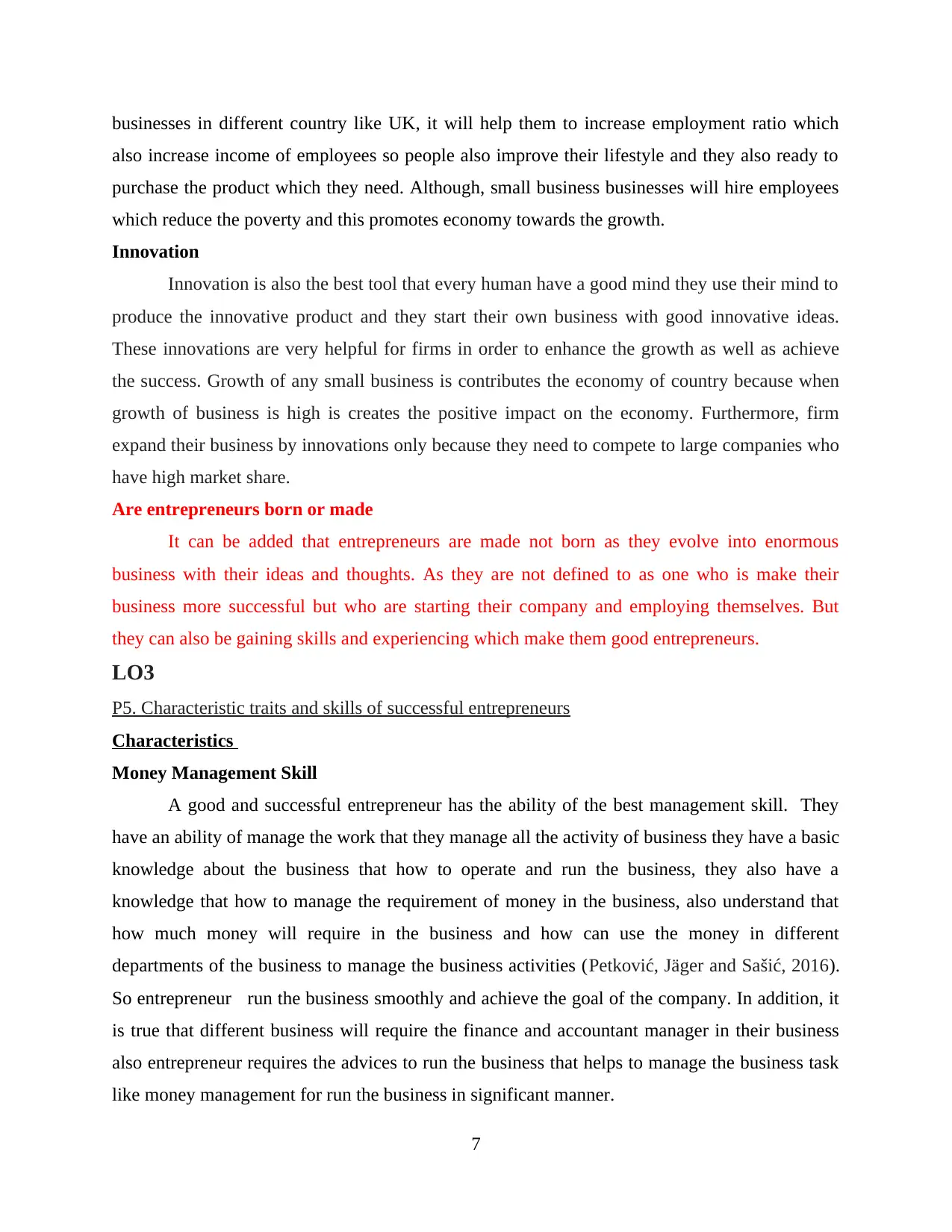
businesses in different country like UK, it will help them to increase employment ratio which
also increase income of employees so people also improve their lifestyle and they also ready to
purchase the product which they need. Although, small business businesses will hire employees
which reduce the poverty and this promotes economy towards the growth.
Innovation
Innovation is also the best tool that every human have a good mind they use their mind to
produce the innovative product and they start their own business with good innovative ideas.
These innovations are very helpful for firms in order to enhance the growth as well as achieve
the success. Growth of any small business is contributes the economy of country because when
growth of business is high is creates the positive impact on the economy. Furthermore, firm
expand their business by innovations only because they need to compete to large companies who
have high market share.
Are entrepreneurs born or made
It can be added that entrepreneurs are made not born as they evolve into enormous
business with their ideas and thoughts. As they are not defined to as one who is make their
business more successful but who are starting their company and employing themselves. But
they can also be gaining skills and experiencing which make them good entrepreneurs.
LO3
P5. Characteristic traits and skills of successful entrepreneurs
Characteristics
Money Management Skill
A good and successful entrepreneur has the ability of the best management skill. They
have an ability of manage the work that they manage all the activity of business they have a basic
knowledge about the business that how to operate and run the business, they also have a
knowledge that how to manage the requirement of money in the business, also understand that
how much money will require in the business and how can use the money in different
departments of the business to manage the business activities (Petković, Jäger and Sašić, 2016).
So entrepreneur run the business smoothly and achieve the goal of the company. In addition, it
is true that different business will require the finance and accountant manager in their business
also entrepreneur requires the advices to run the business that helps to manage the business task
like money management for run the business in significant manner.
7
also increase income of employees so people also improve their lifestyle and they also ready to
purchase the product which they need. Although, small business businesses will hire employees
which reduce the poverty and this promotes economy towards the growth.
Innovation
Innovation is also the best tool that every human have a good mind they use their mind to
produce the innovative product and they start their own business with good innovative ideas.
These innovations are very helpful for firms in order to enhance the growth as well as achieve
the success. Growth of any small business is contributes the economy of country because when
growth of business is high is creates the positive impact on the economy. Furthermore, firm
expand their business by innovations only because they need to compete to large companies who
have high market share.
Are entrepreneurs born or made
It can be added that entrepreneurs are made not born as they evolve into enormous
business with their ideas and thoughts. As they are not defined to as one who is make their
business more successful but who are starting their company and employing themselves. But
they can also be gaining skills and experiencing which make them good entrepreneurs.
LO3
P5. Characteristic traits and skills of successful entrepreneurs
Characteristics
Money Management Skill
A good and successful entrepreneur has the ability of the best management skill. They
have an ability of manage the work that they manage all the activity of business they have a basic
knowledge about the business that how to operate and run the business, they also have a
knowledge that how to manage the requirement of money in the business, also understand that
how much money will require in the business and how can use the money in different
departments of the business to manage the business activities (Petković, Jäger and Sašić, 2016).
So entrepreneur run the business smoothly and achieve the goal of the company. In addition, it
is true that different business will require the finance and accountant manager in their business
also entrepreneur requires the advices to run the business that helps to manage the business task
like money management for run the business in significant manner.
7
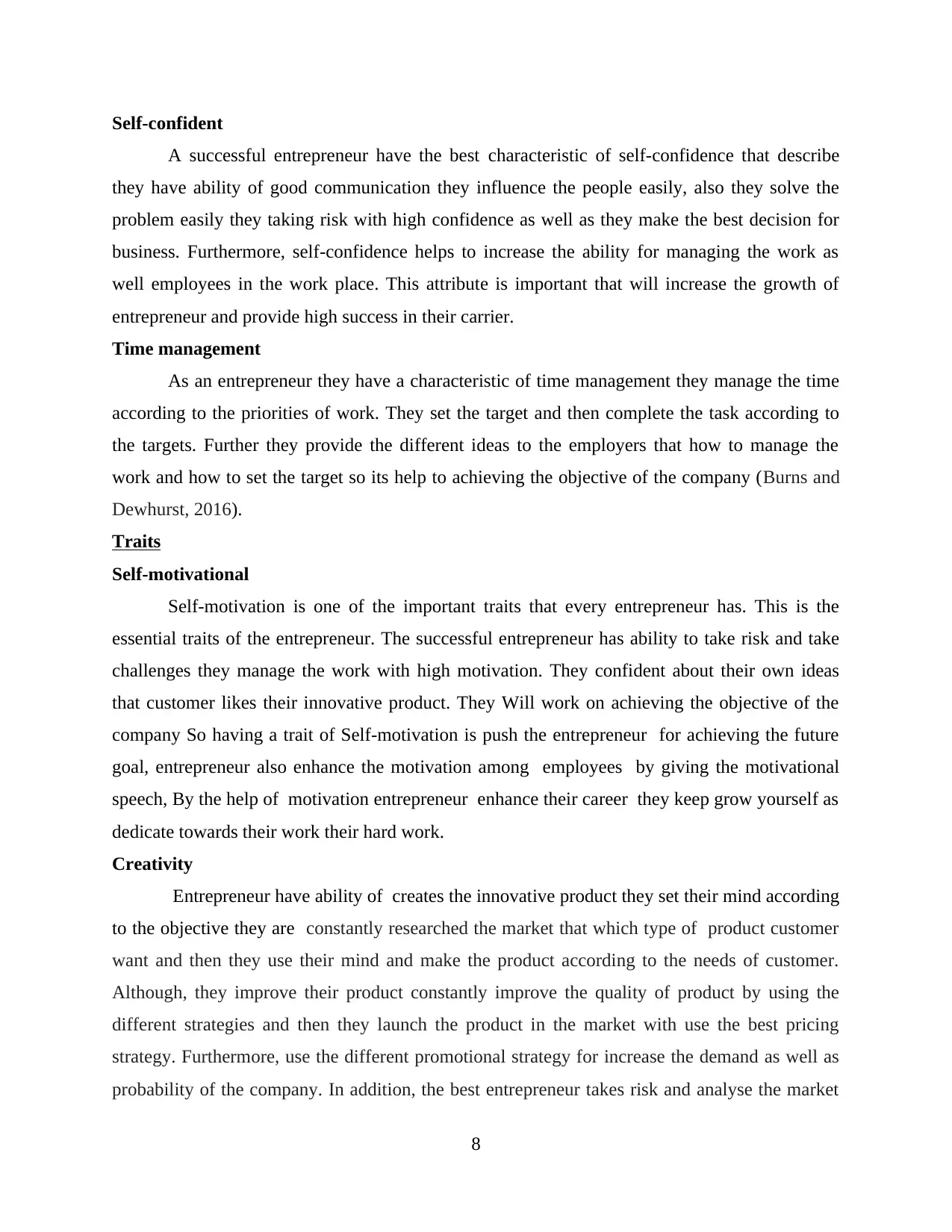
Self-confident
A successful entrepreneur have the best characteristic of self-confidence that describe
they have ability of good communication they influence the people easily, also they solve the
problem easily they taking risk with high confidence as well as they make the best decision for
business. Furthermore, self-confidence helps to increase the ability for managing the work as
well employees in the work place. This attribute is important that will increase the growth of
entrepreneur and provide high success in their carrier.
Time management
As an entrepreneur they have a characteristic of time management they manage the time
according to the priorities of work. They set the target and then complete the task according to
the targets. Further they provide the different ideas to the employers that how to manage the
work and how to set the target so its help to achieving the objective of the company (Burns and
Dewhurst, 2016).
Traits
Self-motivational
Self-motivation is one of the important traits that every entrepreneur has. This is the
essential traits of the entrepreneur. The successful entrepreneur has ability to take risk and take
challenges they manage the work with high motivation. They confident about their own ideas
that customer likes their innovative product. They Will work on achieving the objective of the
company So having a trait of Self-motivation is push the entrepreneur for achieving the future
goal, entrepreneur also enhance the motivation among employees by giving the motivational
speech, By the help of motivation entrepreneur enhance their career they keep grow yourself as
dedicate towards their work their hard work.
Creativity
Entrepreneur have ability of creates the innovative product they set their mind according
to the objective they are constantly researched the market that which type of product customer
want and then they use their mind and make the product according to the needs of customer.
Although, they improve their product constantly improve the quality of product by using the
different strategies and then they launch the product in the market with use the best pricing
strategy. Furthermore, use the different promotional strategy for increase the demand as well as
probability of the company. In addition, the best entrepreneur takes risk and analyse the market
8
A successful entrepreneur have the best characteristic of self-confidence that describe
they have ability of good communication they influence the people easily, also they solve the
problem easily they taking risk with high confidence as well as they make the best decision for
business. Furthermore, self-confidence helps to increase the ability for managing the work as
well employees in the work place. This attribute is important that will increase the growth of
entrepreneur and provide high success in their carrier.
Time management
As an entrepreneur they have a characteristic of time management they manage the time
according to the priorities of work. They set the target and then complete the task according to
the targets. Further they provide the different ideas to the employers that how to manage the
work and how to set the target so its help to achieving the objective of the company (Burns and
Dewhurst, 2016).
Traits
Self-motivational
Self-motivation is one of the important traits that every entrepreneur has. This is the
essential traits of the entrepreneur. The successful entrepreneur has ability to take risk and take
challenges they manage the work with high motivation. They confident about their own ideas
that customer likes their innovative product. They Will work on achieving the objective of the
company So having a trait of Self-motivation is push the entrepreneur for achieving the future
goal, entrepreneur also enhance the motivation among employees by giving the motivational
speech, By the help of motivation entrepreneur enhance their career they keep grow yourself as
dedicate towards their work their hard work.
Creativity
Entrepreneur have ability of creates the innovative product they set their mind according
to the objective they are constantly researched the market that which type of product customer
want and then they use their mind and make the product according to the needs of customer.
Although, they improve their product constantly improve the quality of product by using the
different strategies and then they launch the product in the market with use the best pricing
strategy. Furthermore, use the different promotional strategy for increase the demand as well as
probability of the company. In addition, the best entrepreneur takes risk and analyse the market
8
Secure Best Marks with AI Grader
Need help grading? Try our AI Grader for instant feedback on your assignments.
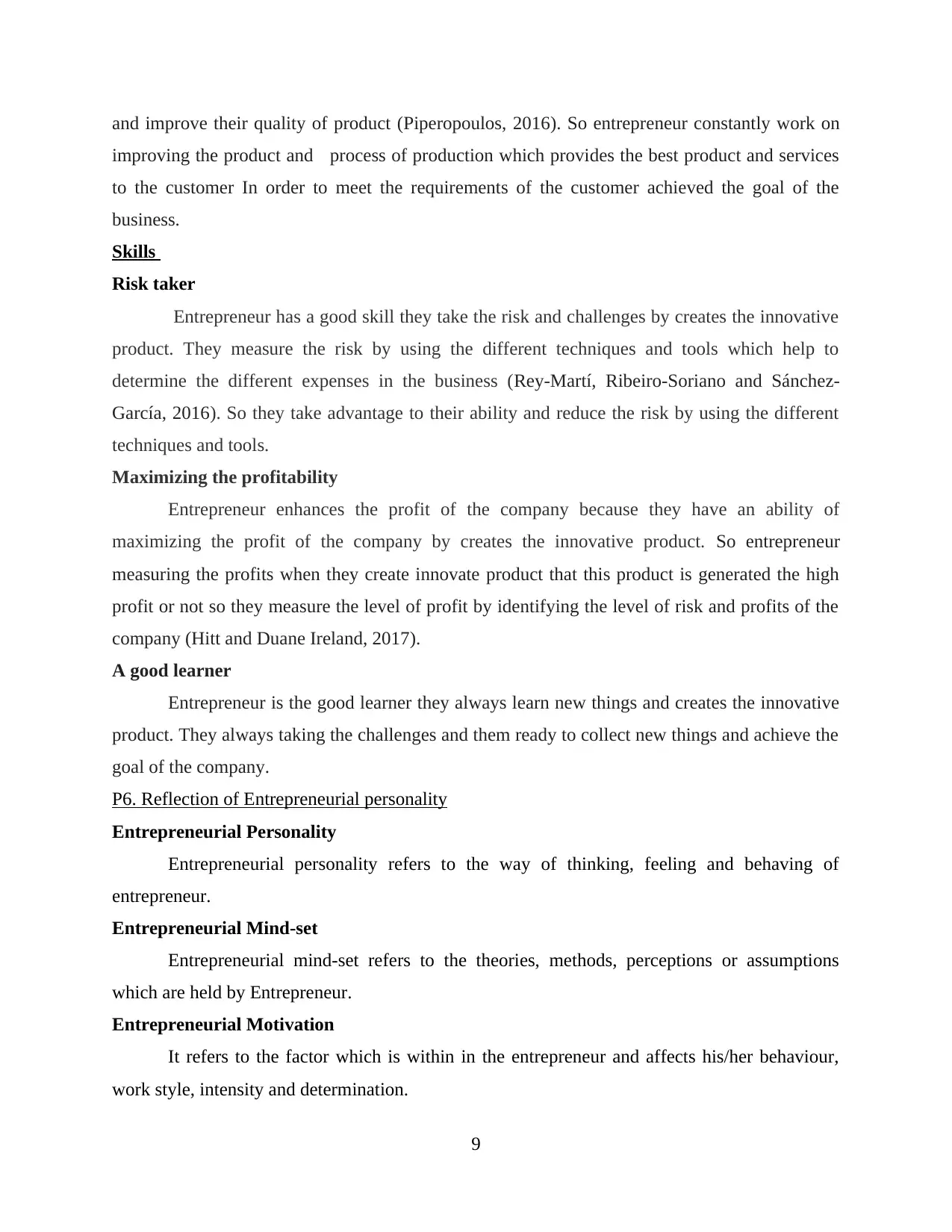
and improve their quality of product (Piperopoulos, 2016). So entrepreneur constantly work on
improving the product and process of production which provides the best product and services
to the customer In order to meet the requirements of the customer achieved the goal of the
business.
Skills
Risk taker
Entrepreneur has a good skill they take the risk and challenges by creates the innovative
product. They measure the risk by using the different techniques and tools which help to
determine the different expenses in the business (Rey-Martí, Ribeiro-Soriano and Sánchez-
García, 2016). So they take advantage to their ability and reduce the risk by using the different
techniques and tools.
Maximizing the profitability
Entrepreneur enhances the profit of the company because they have an ability of
maximizing the profit of the company by creates the innovative product. So entrepreneur
measuring the profits when they create innovate product that this product is generated the high
profit or not so they measure the level of profit by identifying the level of risk and profits of the
company (Hitt and Duane Ireland, 2017).
A good learner
Entrepreneur is the good learner they always learn new things and creates the innovative
product. They always taking the challenges and them ready to collect new things and achieve the
goal of the company.
P6. Reflection of Entrepreneurial personality
Entrepreneurial Personality
Entrepreneurial personality refers to the way of thinking, feeling and behaving of
entrepreneur.
Entrepreneurial Mind-set
Entrepreneurial mind-set refers to the theories, methods, perceptions or assumptions
which are held by Entrepreneur.
Entrepreneurial Motivation
It refers to the factor which is within in the entrepreneur and affects his/her behaviour,
work style, intensity and determination.
9
improving the product and process of production which provides the best product and services
to the customer In order to meet the requirements of the customer achieved the goal of the
business.
Skills
Risk taker
Entrepreneur has a good skill they take the risk and challenges by creates the innovative
product. They measure the risk by using the different techniques and tools which help to
determine the different expenses in the business (Rey-Martí, Ribeiro-Soriano and Sánchez-
García, 2016). So they take advantage to their ability and reduce the risk by using the different
techniques and tools.
Maximizing the profitability
Entrepreneur enhances the profit of the company because they have an ability of
maximizing the profit of the company by creates the innovative product. So entrepreneur
measuring the profits when they create innovate product that this product is generated the high
profit or not so they measure the level of profit by identifying the level of risk and profits of the
company (Hitt and Duane Ireland, 2017).
A good learner
Entrepreneur is the good learner they always learn new things and creates the innovative
product. They always taking the challenges and them ready to collect new things and achieve the
goal of the company.
P6. Reflection of Entrepreneurial personality
Entrepreneurial Personality
Entrepreneurial personality refers to the way of thinking, feeling and behaving of
entrepreneur.
Entrepreneurial Mind-set
Entrepreneurial mind-set refers to the theories, methods, perceptions or assumptions
which are held by Entrepreneur.
Entrepreneurial Motivation
It refers to the factor which is within in the entrepreneur and affects his/her behaviour,
work style, intensity and determination.
9
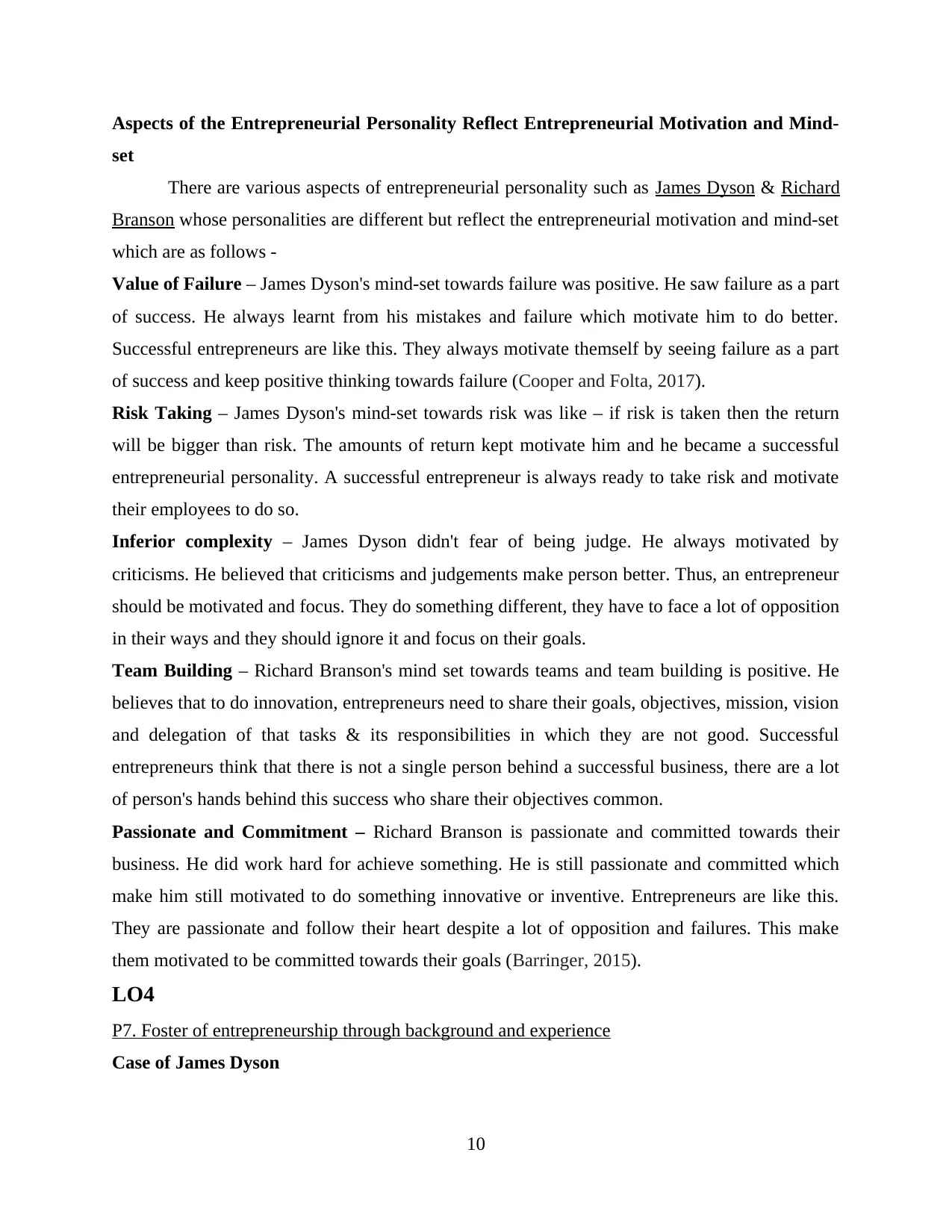
Aspects of the Entrepreneurial Personality Reflect Entrepreneurial Motivation and Mind-
set
There are various aspects of entrepreneurial personality such as James Dyson & Richard
Branson whose personalities are different but reflect the entrepreneurial motivation and mind-set
which are as follows -
Value of Failure – James Dyson's mind-set towards failure was positive. He saw failure as a part
of success. He always learnt from his mistakes and failure which motivate him to do better.
Successful entrepreneurs are like this. They always motivate themself by seeing failure as a part
of success and keep positive thinking towards failure (Cooper and Folta, 2017).
Risk Taking – James Dyson's mind-set towards risk was like – if risk is taken then the return
will be bigger than risk. The amounts of return kept motivate him and he became a successful
entrepreneurial personality. A successful entrepreneur is always ready to take risk and motivate
their employees to do so.
Inferior complexity – James Dyson didn't fear of being judge. He always motivated by
criticisms. He believed that criticisms and judgements make person better. Thus, an entrepreneur
should be motivated and focus. They do something different, they have to face a lot of opposition
in their ways and they should ignore it and focus on their goals.
Team Building – Richard Branson's mind set towards teams and team building is positive. He
believes that to do innovation, entrepreneurs need to share their goals, objectives, mission, vision
and delegation of that tasks & its responsibilities in which they are not good. Successful
entrepreneurs think that there is not a single person behind a successful business, there are a lot
of person's hands behind this success who share their objectives common.
Passionate and Commitment – Richard Branson is passionate and committed towards their
business. He did work hard for achieve something. He is still passionate and committed which
make him still motivated to do something innovative or inventive. Entrepreneurs are like this.
They are passionate and follow their heart despite a lot of opposition and failures. This make
them motivated to be committed towards their goals (Barringer, 2015).
LO4
P7. Foster of entrepreneurship through background and experience
Case of James Dyson
10
set
There are various aspects of entrepreneurial personality such as James Dyson & Richard
Branson whose personalities are different but reflect the entrepreneurial motivation and mind-set
which are as follows -
Value of Failure – James Dyson's mind-set towards failure was positive. He saw failure as a part
of success. He always learnt from his mistakes and failure which motivate him to do better.
Successful entrepreneurs are like this. They always motivate themself by seeing failure as a part
of success and keep positive thinking towards failure (Cooper and Folta, 2017).
Risk Taking – James Dyson's mind-set towards risk was like – if risk is taken then the return
will be bigger than risk. The amounts of return kept motivate him and he became a successful
entrepreneurial personality. A successful entrepreneur is always ready to take risk and motivate
their employees to do so.
Inferior complexity – James Dyson didn't fear of being judge. He always motivated by
criticisms. He believed that criticisms and judgements make person better. Thus, an entrepreneur
should be motivated and focus. They do something different, they have to face a lot of opposition
in their ways and they should ignore it and focus on their goals.
Team Building – Richard Branson's mind set towards teams and team building is positive. He
believes that to do innovation, entrepreneurs need to share their goals, objectives, mission, vision
and delegation of that tasks & its responsibilities in which they are not good. Successful
entrepreneurs think that there is not a single person behind a successful business, there are a lot
of person's hands behind this success who share their objectives common.
Passionate and Commitment – Richard Branson is passionate and committed towards their
business. He did work hard for achieve something. He is still passionate and committed which
make him still motivated to do something innovative or inventive. Entrepreneurs are like this.
They are passionate and follow their heart despite a lot of opposition and failures. This make
them motivated to be committed towards their goals (Barringer, 2015).
LO4
P7. Foster of entrepreneurship through background and experience
Case of James Dyson
10

James Dyson was a good long distance runner. But due to his father's death, he had to
leave it. But he became determined due to long distance runner. After his father's death, he went
to Byam Shaw School of Art and Royal College of Art where he learnt and studied about
furniture and interior design. During his college life, he faced loss of suction quality by a lot of
dirt pick up by the object. Thus, he decided to do something innovative. He decided to make
vacuum cleaner which pick up the dirt and less loss of suction quality. He struggled a lot but he
never gave up. He kept self-motivated and did a lot of creation of several prototypes. After
struggling for long 5 years, he finally made vacuum cleaner and gave it G-Force name. But, his
journey as an entrepreneur didn't stop. He had to do a lot of struggles and take a lot of risks. But
he didn't give up. His determination was so strong which keep foster his motivation and
committed towards his invention. His invention also got so many rejections from manufacturer
or distributors. He decided to open his own company which was a big risk itself, but he didn't
afraid of it. Today, many entrepreneurs are getting motivating by his determination level.
Case of Richard Branson
When he was born, his family were facing financial issues due to illness of his father.
Moreover, he has some disabilities in learning. A lot of constraints came into his life but he
never gave up and become one of most successful younger entrepreneur which he still is. In year
1967, he just gave upon his school in order to start his first business which is known as Student
magazine. In year 1984, he started his first airline but before that it failed due to damage in
engine. In year 1994, he started his own soda business which was expected to be different from
other soda, but it didn't happen. Like this a lot of barriers and issues came into his entrepreneur
journey but he didn't stop. He kept doing things, he stayed optimistic, he learnt from his mistakes
and never repeats that mistakes. Thus, this all influenced and improved his personality. Today
his personality is considered to be most successful personalities for successful entrepreneur
(Cooper, 2017).
CONCLUSION
From the above study, it has been summarized that entrepreneurs plays an important role
in business world. They are the one who change the whole corporate world by brining innovative
products and services. But, they also bring a lot of risk factors which can be reason behind the
failure of entrepreneurship. There are various types of entrepreneurial ventures which boost the
innovation and change the business trends. They start their business by operating micro – small –
11
leave it. But he became determined due to long distance runner. After his father's death, he went
to Byam Shaw School of Art and Royal College of Art where he learnt and studied about
furniture and interior design. During his college life, he faced loss of suction quality by a lot of
dirt pick up by the object. Thus, he decided to do something innovative. He decided to make
vacuum cleaner which pick up the dirt and less loss of suction quality. He struggled a lot but he
never gave up. He kept self-motivated and did a lot of creation of several prototypes. After
struggling for long 5 years, he finally made vacuum cleaner and gave it G-Force name. But, his
journey as an entrepreneur didn't stop. He had to do a lot of struggles and take a lot of risks. But
he didn't give up. His determination was so strong which keep foster his motivation and
committed towards his invention. His invention also got so many rejections from manufacturer
or distributors. He decided to open his own company which was a big risk itself, but he didn't
afraid of it. Today, many entrepreneurs are getting motivating by his determination level.
Case of Richard Branson
When he was born, his family were facing financial issues due to illness of his father.
Moreover, he has some disabilities in learning. A lot of constraints came into his life but he
never gave up and become one of most successful younger entrepreneur which he still is. In year
1967, he just gave upon his school in order to start his first business which is known as Student
magazine. In year 1984, he started his first airline but before that it failed due to damage in
engine. In year 1994, he started his own soda business which was expected to be different from
other soda, but it didn't happen. Like this a lot of barriers and issues came into his entrepreneur
journey but he didn't stop. He kept doing things, he stayed optimistic, he learnt from his mistakes
and never repeats that mistakes. Thus, this all influenced and improved his personality. Today
his personality is considered to be most successful personalities for successful entrepreneur
(Cooper, 2017).
CONCLUSION
From the above study, it has been summarized that entrepreneurs plays an important role
in business world. They are the one who change the whole corporate world by brining innovative
products and services. But, they also bring a lot of risk factors which can be reason behind the
failure of entrepreneurship. There are various types of entrepreneurial ventures which boost the
innovation and change the business trends. They start their business by operating micro – small –
11
Paraphrase This Document
Need a fresh take? Get an instant paraphrase of this document with our AI Paraphraser

medium enterprise because it impact the economy in a positive way if they get support from their
stakeholders. It also helps in social economy growth by providing various employment
opportunities and fulfils the needs of societies. To become a successful entrepreneur, there are
various characteristic traits and skills which provide accurate medium to carry out the role. These
traits and skills build effective personalities which motivate the entrepreneur to do something
innovative and build their mind set positive. Also, it impacts by their background and experience
too.
12
stakeholders. It also helps in social economy growth by providing various employment
opportunities and fulfils the needs of societies. To become a successful entrepreneur, there are
various characteristic traits and skills which provide accurate medium to carry out the role. These
traits and skills build effective personalities which motivate the entrepreneur to do something
innovative and build their mind set positive. Also, it impacts by their background and experience
too.
12
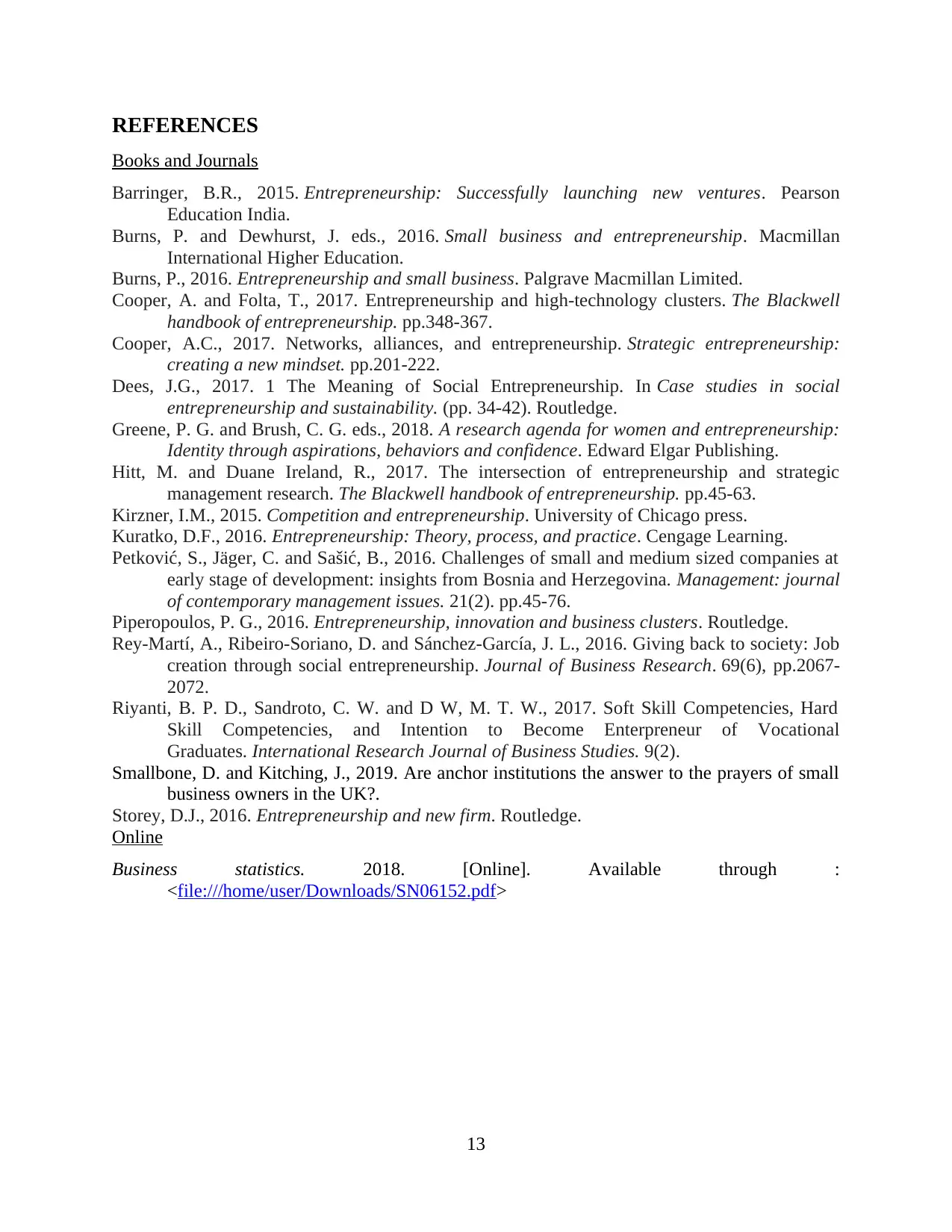
REFERENCES
Books and Journals
Barringer, B.R., 2015. Entrepreneurship: Successfully launching new ventures. Pearson
Education India.
Burns, P. and Dewhurst, J. eds., 2016. Small business and entrepreneurship. Macmillan
International Higher Education.
Burns, P., 2016. Entrepreneurship and small business. Palgrave Macmillan Limited.
Cooper, A. and Folta, T., 2017. Entrepreneurship and high‐technology clusters. The Blackwell
handbook of entrepreneurship. pp.348-367.
Cooper, A.C., 2017. Networks, alliances, and entrepreneurship. Strategic entrepreneurship:
creating a new mindset. pp.201-222.
Dees, J.G., 2017. 1 The Meaning of Social Entrepreneurship. In Case studies in social
entrepreneurship and sustainability. (pp. 34-42). Routledge.
Greene, P. G. and Brush, C. G. eds., 2018. A research agenda for women and entrepreneurship:
Identity through aspirations, behaviors and confidence. Edward Elgar Publishing.
Hitt, M. and Duane Ireland, R., 2017. The intersection of entrepreneurship and strategic
management research. The Blackwell handbook of entrepreneurship. pp.45-63.
Kirzner, I.M., 2015. Competition and entrepreneurship. University of Chicago press.
Kuratko, D.F., 2016. Entrepreneurship: Theory, process, and practice. Cengage Learning.
Petković, S., Jäger, C. and Sašić, B., 2016. Challenges of small and medium sized companies at
early stage of development: insights from Bosnia and Herzegovina. Management: journal
of contemporary management issues. 21(2). pp.45-76.
Piperopoulos, P. G., 2016. Entrepreneurship, innovation and business clusters. Routledge.
Rey-Martí, A., Ribeiro-Soriano, D. and Sánchez-García, J. L., 2016. Giving back to society: Job
creation through social entrepreneurship. Journal of Business Research. 69(6), pp.2067-
2072.
Riyanti, B. P. D., Sandroto, C. W. and D W, M. T. W., 2017. Soft Skill Competencies, Hard
Skill Competencies, and Intention to Become Enterpreneur of Vocational
Graduates. International Research Journal of Business Studies. 9(2).
Smallbone, D. and Kitching, J., 2019. Are anchor institutions the answer to the prayers of small
business owners in the UK?.
Storey, D.J., 2016. Entrepreneurship and new firm. Routledge.
Online
Business statistics. 2018. [Online]. Available through :
<file:///home/user/Downloads/SN06152.pdf>
13
Books and Journals
Barringer, B.R., 2015. Entrepreneurship: Successfully launching new ventures. Pearson
Education India.
Burns, P. and Dewhurst, J. eds., 2016. Small business and entrepreneurship. Macmillan
International Higher Education.
Burns, P., 2016. Entrepreneurship and small business. Palgrave Macmillan Limited.
Cooper, A. and Folta, T., 2017. Entrepreneurship and high‐technology clusters. The Blackwell
handbook of entrepreneurship. pp.348-367.
Cooper, A.C., 2017. Networks, alliances, and entrepreneurship. Strategic entrepreneurship:
creating a new mindset. pp.201-222.
Dees, J.G., 2017. 1 The Meaning of Social Entrepreneurship. In Case studies in social
entrepreneurship and sustainability. (pp. 34-42). Routledge.
Greene, P. G. and Brush, C. G. eds., 2018. A research agenda for women and entrepreneurship:
Identity through aspirations, behaviors and confidence. Edward Elgar Publishing.
Hitt, M. and Duane Ireland, R., 2017. The intersection of entrepreneurship and strategic
management research. The Blackwell handbook of entrepreneurship. pp.45-63.
Kirzner, I.M., 2015. Competition and entrepreneurship. University of Chicago press.
Kuratko, D.F., 2016. Entrepreneurship: Theory, process, and practice. Cengage Learning.
Petković, S., Jäger, C. and Sašić, B., 2016. Challenges of small and medium sized companies at
early stage of development: insights from Bosnia and Herzegovina. Management: journal
of contemporary management issues. 21(2). pp.45-76.
Piperopoulos, P. G., 2016. Entrepreneurship, innovation and business clusters. Routledge.
Rey-Martí, A., Ribeiro-Soriano, D. and Sánchez-García, J. L., 2016. Giving back to society: Job
creation through social entrepreneurship. Journal of Business Research. 69(6), pp.2067-
2072.
Riyanti, B. P. D., Sandroto, C. W. and D W, M. T. W., 2017. Soft Skill Competencies, Hard
Skill Competencies, and Intention to Become Enterpreneur of Vocational
Graduates. International Research Journal of Business Studies. 9(2).
Smallbone, D. and Kitching, J., 2019. Are anchor institutions the answer to the prayers of small
business owners in the UK?.
Storey, D.J., 2016. Entrepreneurship and new firm. Routledge.
Online
Business statistics. 2018. [Online]. Available through :
<file:///home/user/Downloads/SN06152.pdf>
13
1 out of 15
Related Documents
Your All-in-One AI-Powered Toolkit for Academic Success.
+13062052269
info@desklib.com
Available 24*7 on WhatsApp / Email
![[object Object]](/_next/static/media/star-bottom.7253800d.svg)
Unlock your academic potential
© 2024 | Zucol Services PVT LTD | All rights reserved.





